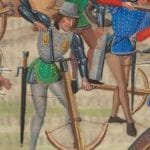 Crime
Crime  Crime
Crime  Technology
Technology 10 Hilariously Over-Engineered Solutions to Simple Problems
 Miscellaneous
Miscellaneous 10 Ironic News Stories Straight out of an Alanis Morissette Song
 Politics
Politics 10 Lesser-Known Far-Right Groups of the 21st Century
 History
History Ten Revealing Facts about Daily Domestic Life in the Old West
 Weird Stuff
Weird Stuff 10 Everyday Products Surprisingly Made by Inmates
 Movies and TV
Movies and TV 10 Actors Dragged out of Retirement for One Key Role
 Creepy
Creepy 10 Lesser-Known Shapeshifter Legends from Around the World
 Animals
Animals 10 Amazing Animal Tales from the Ancient World
 Gaming
Gaming 10 Game Characters Everyone Hated Playing
 Crime
Crime 10 Terrifying Serial Killers from Centuries Ago
 Technology
Technology 10 Hilariously Over-Engineered Solutions to Simple Problems
 Miscellaneous
Miscellaneous 10 Ironic News Stories Straight out of an Alanis Morissette Song
Who's Behind Listverse?

Jamie Frater
Head Editor
Jamie founded Listverse due to an insatiable desire to share fascinating, obscure, and bizarre facts. He has been a guest speaker on numerous national radio and television stations and is a five time published author.
More About Us Politics
Politics 10 Lesser-Known Far-Right Groups of the 21st Century
 History
History Ten Revealing Facts about Daily Domestic Life in the Old West
 Weird Stuff
Weird Stuff 10 Everyday Products Surprisingly Made by Inmates
 Movies and TV
Movies and TV 10 Actors Dragged out of Retirement for One Key Role
 Creepy
Creepy 10 Lesser-Known Shapeshifter Legends from Around the World
 Animals
Animals 10 Amazing Animal Tales from the Ancient World
 Gaming
Gaming 10 Game Characters Everyone Hated Playing
Top 10 Greatest Plot Twists In History
From arrogant emperors failing miserably, to seemingly successful rebellions gone wrong, there are many twists and turns in the story of mankind. This list recounts just 10 of the greatest and most bizarre plot twists ever to happen in human history.
10 Real Tales Of Prejudice With Unbelievable Twists
10 An Imposter German Ship Meets Its Real British Counterpart
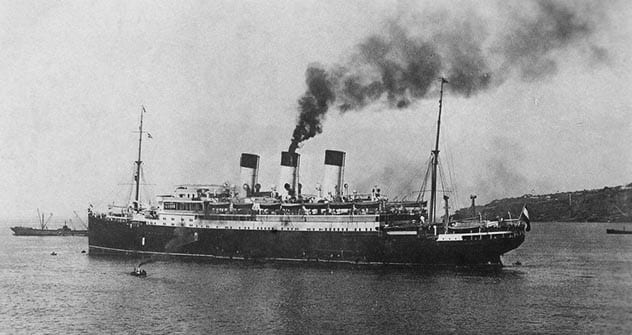
During the First World War, the Germans disguised one of their ships, the SMS Cap Trafalgar, as the British liner RMS Carmania. However, by an unlucky stroke of irony, the first ship they encountered near the Island of Trinidade, off the coast of Brazil, (Note: Not Trinidad) was the real RMS Carmania, whose Captain, Noel Grant, immediately recognized their attempt to trick British ships, and launched a surprise attack early in the morning, ultimately leading to the sinking of the SMS Cap Trafalgar. Nice try, Germans.[1]
9 An Enraged Emperor Turns An Island Into A Peninsula
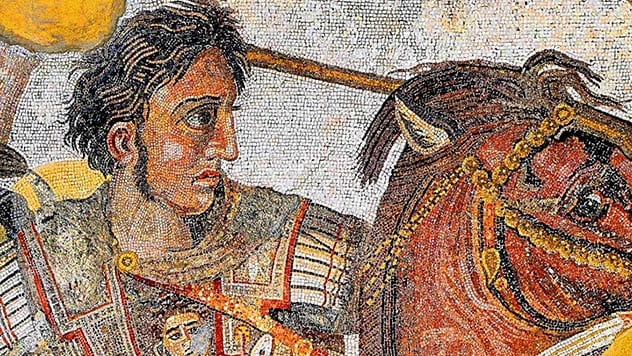
At the height of the war between the empires, (of Rome and Persia) Alexander the Great decided that he wanted to worship at a temple on the Island of Tyre. The island’s leaders refused, because they wanted to remain neutral in the war against Persia, and allowing the emperor to worship there would send a message to the Persians that Tyre took the side of their enemy. They told the emperor to pray at a temple in Old Tyre, which was located on the mainland, instead.
Alexander, angered by this show of disrespect, saw this as a declaration of war, occupied Old Tyre and spent 6 months building a bridge to the island, using logs and stones from the ruins of Old Tyre. When he reached Tyre, he crucified almost everyone in the city, and sold the rest into slavery.
Tyre is still a peninsula today, and technically, it is now part of the mainland.
Never say no to a world-conquering Emperor.[2]
8 A Rude Welcome Costs An Empire
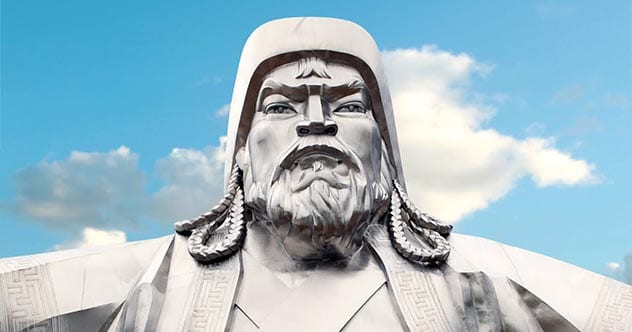
During the reign of the Mongol Empire, Genghis Khan sent a large trading caravan to Khwarezmia, an empire in the Middle East, hoping to start an alliance. However, the local Governor did not welcome these travellers, and arrested them and sentenced them to death.
Genghis responded to this by sending a few of his ambassadors to ask the Shah to release his men, and to explain his intent to create an alliance. Instead of hearing what they had to say, the Shah beheaded one of the ambassadors, and sent the others back with their heads shaved, which was a big insult to the Khan. Genghis Khan began to plan his revenge. He invaded the empire with force, and the Shah was forced to escape to an island off the Caspian coast to die.
Two years later, there was no Khwarezmian Empire.[3]
7 A Paranoid King Who’s Immune To Poison
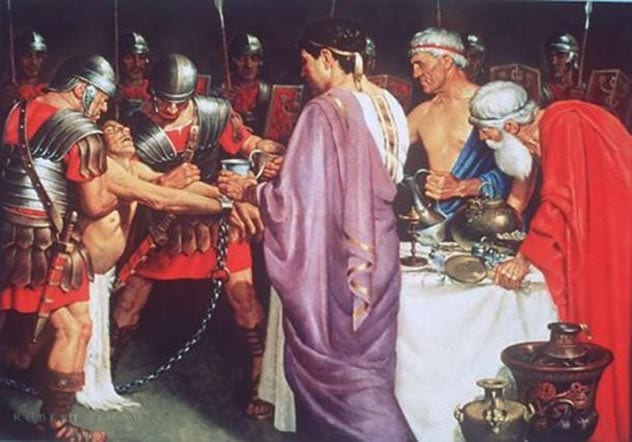
Mithridates VI ruled the Kingdom of Pontus around 100 BC. He was extremely paranoid that someone would try to assassinate him with poison, and so he took small doses of poison each day to build up his tolerance. Unfortunately, when he tried to kill himself after being captured by Romans (The more honorable path than being sold as a Roman slave), he was unable to as he was immune. Perhaps he should’ve channelled his paranoia into building a better army instead.[4]
6 Twice The Bad Luck For Kublai Khan
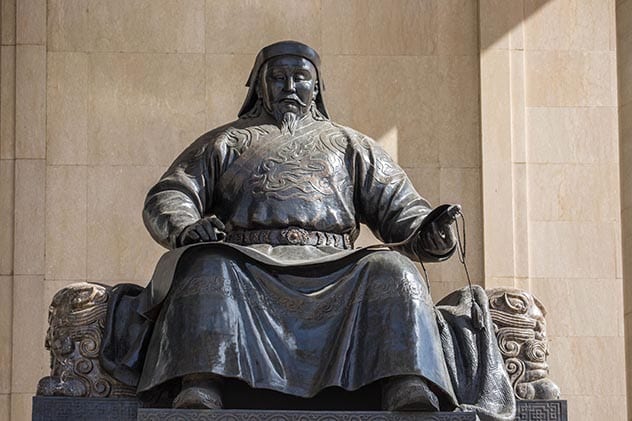
Kublai Khan was the 5th Khagan of the Mongol Empire. It was 1274 and Kublai Khan had run out of China to conquer, so now he decided that he was going to conquer Japan. His first attack fleet was fended off by Japanese Samurai, so they began their return to China to recuperate and plan a stronger follow up attack. Unfortunately for them however, on the way back to China, the fleet was sunk by a typhoon.
It was 1281 and Kublai Khan was back, and he still had his eyes set on Japan. He launched the 2nd biggest naval invasion the world would ever see (Biggest: D-Day), and when they arrived at the shores of Japan, they discovered that the Japanese had blocked off their beaches with seawalls. The fleet trawled around the coast of Japan, searching for a place to land, and continued to search, right up until the day that the fleet was destroyed by a second typhoon.[5]
The name of these two typhoons? Kamikaze; “God-Wind”.
10 Viral Stories With Unexpected Twist Endings
5 The Statesman Who Wasn’t Bluffing
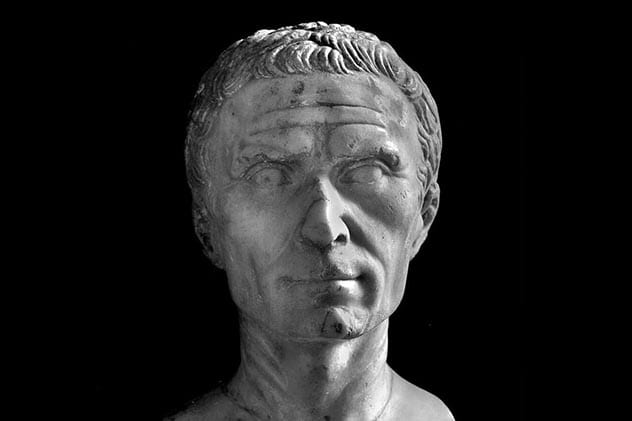
When Julius Caesar was captured by pirates who didn’t know who he was, they demanded 20 talents of silver for his freedom. Caesar was offended by this small amount, laughed, and told them to ask for at least 50, which they got. Caesar seemed to enjoy their company whilst he waited for his men to bring the silver the pirates had asked for, joining in with their games, and acting almost like he was of them. He often joked that he was going to have them arrested and crucified after they let him go, which they all found very funny and laughed with him—until they were arrested and crucified after they let him go.[6]
4 A Diplomat Slip-Up At The Berlin Wall

On the night the Berlin Wall came down, an East German diplomat named Gunter Schabowski had just returned back from a tiring trip to Poland, and was due to read an announcement about travel rules changing for a live press conference. Since he had just returned from Poland, he hadn’t been fully briefed on the new rules, one of which was that East Berliners could apply for Visas to go to the West for short trips, and wait until a couple of days after the announcement to apply and be accepted. The announcement was rushed and unclear, and started by saying things like “Liberalization of travel rules…blah blah…can now visit the West…blah blah.” Schabowski hadn’t read his speech before going live on air, and so he was reading this information for the first time. One journalist asked when these new rules would come into effect, and wanting to look prepared, Schabowski replied, “Uh…immediately, now.”
This spread fast and caused people to gather at the Wall, asking to be let out. There had been important protests before, but nothing as big as this. By coincidence, a border guard at the wall was preoccupied because had recently been tested for cancer, and was waiting for his results. So, he didn’t care enough about his job to stop the mass of people and opened the first gate, leading to the liberation of the people of East Berlin.[7]
3 Darius The Wizard Slayer
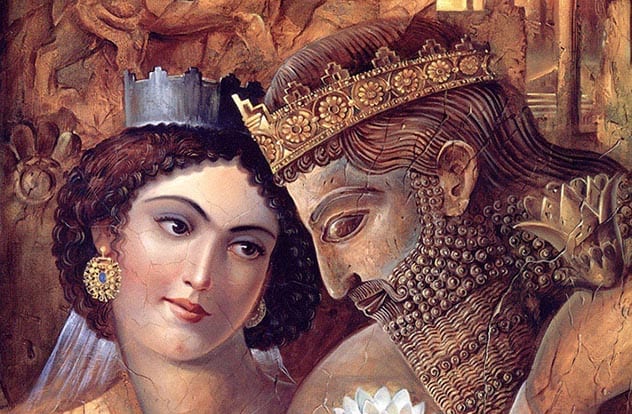
Darius the Great had a very interesting ascension to the throne of Persia, when he was caught red-handed standing over his dead predecessor with a knife. Of course, the magi who discovered him began to call for the guards, as Darius had clearly just murdered the Emperor. However, Darius claimed that he had not killed the emperor, as the man who he has just killed was a shapeshifting wizard. He claimed that this was not the real Emperor, but an imposter who had done away with the Emperor and took the throne for himself.
The magi consulted, and decided that Darius was telling the truth, because why would anyone lie about something like that?
They unanimously decided to raise Darius the Wizard Slayer to the throne of Persia. He became one of the greatest rulers of the Achaemenid Dynasty, and was famous for his genius. This may have been due to the fact that everyone else was stupid enough to believe in shapeshifting wizards…[8]
2 D’Eon’s Double Cross
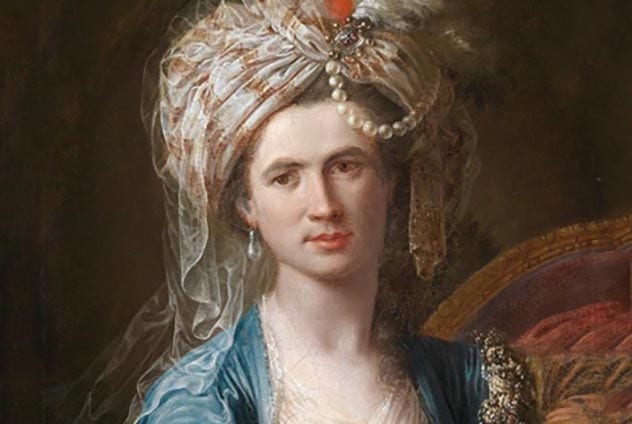
Chevalier d’Eon was a French diplomat and spy in England and Russia. Once d’Eon retired it was revealed to the public that they had been a woman the entire time. They were then made to wear female clothing because of societal expectations of women. They went on to write some books and support the American Revolution. But here’s the kicker. When d’Eon died, the woman who was dressing the body for burial discovered that d’Eon was, in fact, biologically male, and had been a man pretending to be a woman pretending to be a man.[9]
1 The British Revolution – Or Not
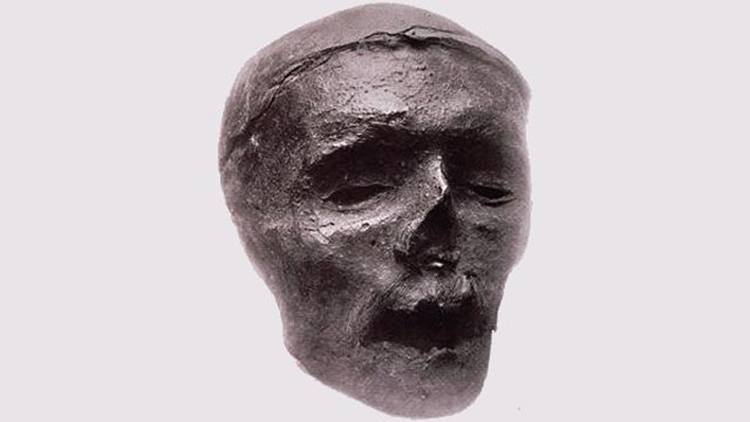
When the people of England rebelled against their king, Charles I, they were successful, had him beheaded, and put a new leader in charge, Oliver Cromwell. However, once Cromwell was given the position of ruler, the power got to his head and he became exactly the same as the kings who had come before him, perhaps even worse. He was more controlling, committed genocide in Ireland, outlawed Christmas celebrations and all fun, and declared his son as his heir. What was meant to be a new beginning for the country was turned into a brutal dictatorship. And so the people of England rebelled once again, were successful, and shortly after, Cromwell died of malaria. The original heir of Charles I, Charles II, was appointed as king, restoring the monarchy. Despite already being dead, Cromwell was then beheaded himself for the beheading of Charles I, and his head was displayed on a pike (and is pictured above). Charles II became one of the most popular monarchs in British history.[10]
10 Mysteries Resolved By Unbelievable Surprise Twists
About The Author: I am a college student studying English Language and Linguistics, who is particularly interested in ancient languages and civilizations.








